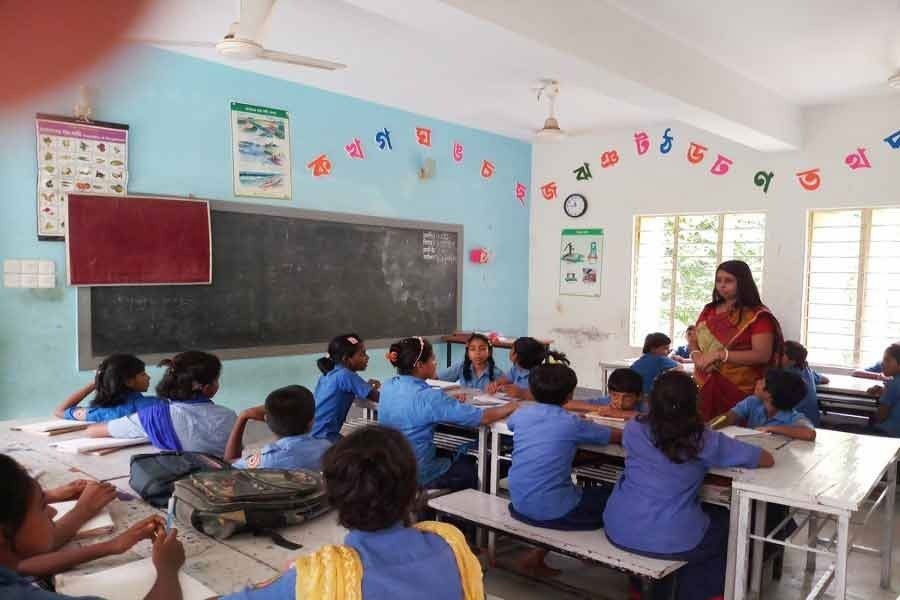55 per cent of children have anxiety, 37 per cent don’t want to go to school: Survey

Published :
Updated :

The Campaign for Popular Education and the BRAC Institute of Education Development have said that anxiety has increased among primary school children in the country due to political unrest, violence, the long-term negative impact of COVID-19 and natural disasters are contributing factors, researchers say
A survey by the two organisations on the matter found that 55.2 percent of children are anxious or scared, and 36.9 percent of students do not want to go to school.
In addition, the survey also revealed that 36.5 percent of children are inattentive to their studies, 28.6 percent have suffered mental damage and 7.9 percent of children have become irritable.
The data was presented at a discussion titled ‘Developing the mental health of primary school students: What we can do’ organised at the Bangabandhu International Conference Center in the capital on Monday. The Campaign for Popular Education and BRAC Institute of Education Development organised the event.
Stakeholders have expressed the opinion that a joint initiative should be taken to improve the mental health of primary school students.
Explaining the survey process, the two organisations say that the study was conducted through a questionnaire with the opinions of stakeholders from a total of 203 support organisations in the eight divisions of the country. At the same time, these opinions were collected through 12 discussions, opinion collection, and a total of four meetings at the divisional and national levels.
Prof M Nazmul Haq, director of the Teacher Development Institute, and Abdur Rouf, programme manager of the Campaign for Popular Education, presented the results of the survey at the event.
The survey reveals that the long-term negative impact of COVID-19, the recent political unrest and violence, and the devastating floods that occurred in the past few months have affected the mental health of children.
The survey says that students leaving school and taking to the streets, witnessing marches, violence, vandalism, arson, fighting, seeing or hearing students being shot at on the streets, staying indoors due to school closures, curfews or blockade have affected the mental health of children.
As a result, a kind of ‘trauma’ has emerged among the students, the research says.
The survey found that changes in the mental health of primary school students have resulted in an unwillingness to go to school and reluctance to study, fearfulness, sleep problems and nightmares, melancholy and depression, addiction to mobile phones, irritability, unruliness and violence, and fear or anxiety about changes in textbooks or curriculum.
In addition, the survey revealed that children have developed negative perceptions after seeing pictures and news on various social media, lost their sense of playfulness or developed a sense of loneliness. Many were affected by various diseases due to floods, and the rate of absenteeism in schools has increased.
At the meeting, Kazi Faruk Ahmed, a member of the National Education Policy 2010 Formulation Committee and teacher leader, said: “The curriculum reform that was carried out before COVID did not take into account the opinions of the education stakeholders. This has had an impact on the students.”
Stating that rapid changes in education are not possible, he said: “Now the mothers of students are also teachers. Therefore, if necessary, guardians must be trained to ensure proper education for children.”
Primary teacher leader Shahinur Al-Amin proposed to increase ‘cultural practices in schools’ to overcome these crises.
Another teacher leader, Abul Kashem, highlighted the need to arrange playgrounds in schools and said: “It is important to renovate schools that do not have playgrounds but have the available land and take measures to establish playgrounds.”
In addition, some other results and several recommendations for solutions were highlighted in the survey.
Among these recommendations are the implementation of the Child Protection Act, 2013 at the government level, the inclusion of mental health issues in teacher training curricula, organising trauma counseling programmes in educational institutions, enhancing the skills of teachers to assess students’ mental health problems, keeping school playgrounds open for students to conduct sports and other programmes, and ensuring adequate resources and budget allocation for students’ mental health services.
The meeting was chaired by Rasheda K Chowdhury, executive director of the Campaign for Popular Education. In her closing remarks, she said, “To ensure their education, children need to maintain their mental health. Therefore, we will present the proposals received from the meeting to the government so that the government can take the necessary measures.”
She also highlighted the importance of working together with the government and stakeholders to maintain the mental health of children.
Speaking as the chief guest at the meeting, Bidhan Ranjan Roy Podder, advisor to the Ministry of Primary and Mass Education, said: “If we cannot enact social change, it will not be possible to improve the mental health of children by counseling alone. The government is doing the necessary work.”
Stating that ‘10 beautiful schools’ will be inaugurated this month, the advisor said, “These schools have been arranged separately. We are also working on arranging other schools as well. These will help to maintain the mental health of children.”


 For all latest news, follow The Financial Express Google News channel.
For all latest news, follow The Financial Express Google News channel.